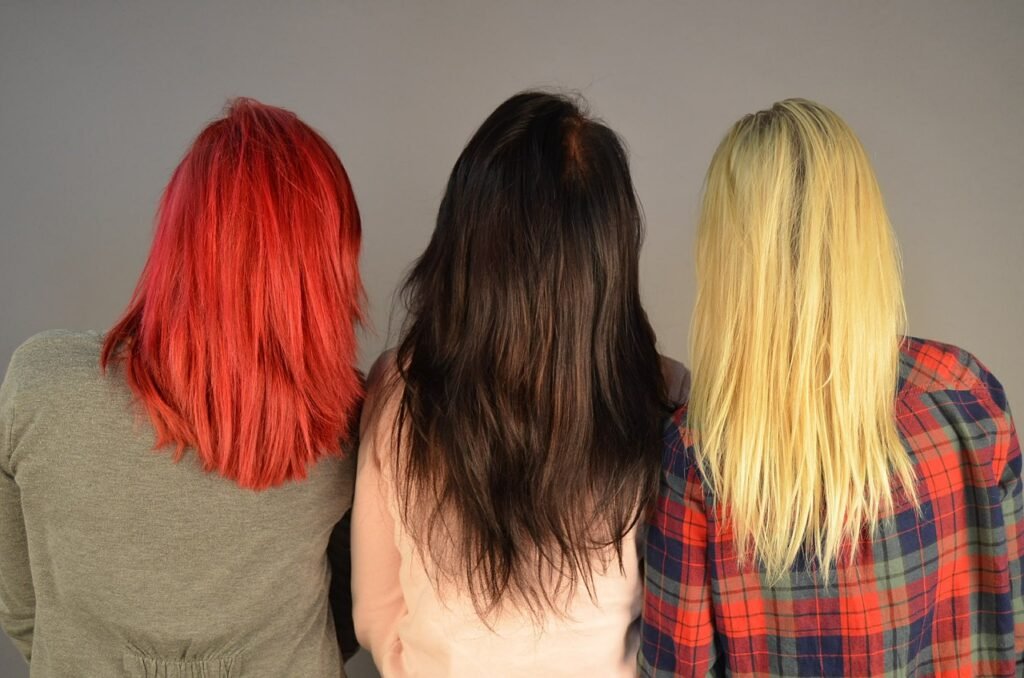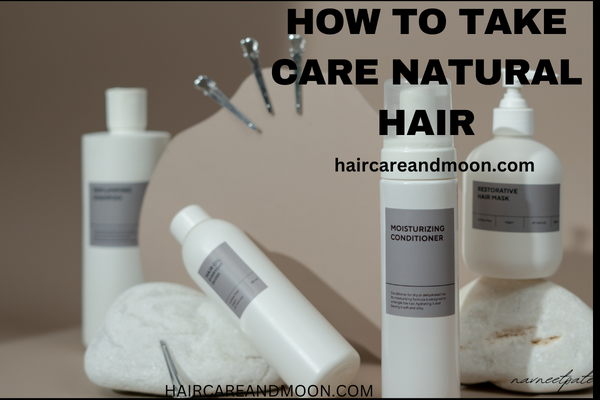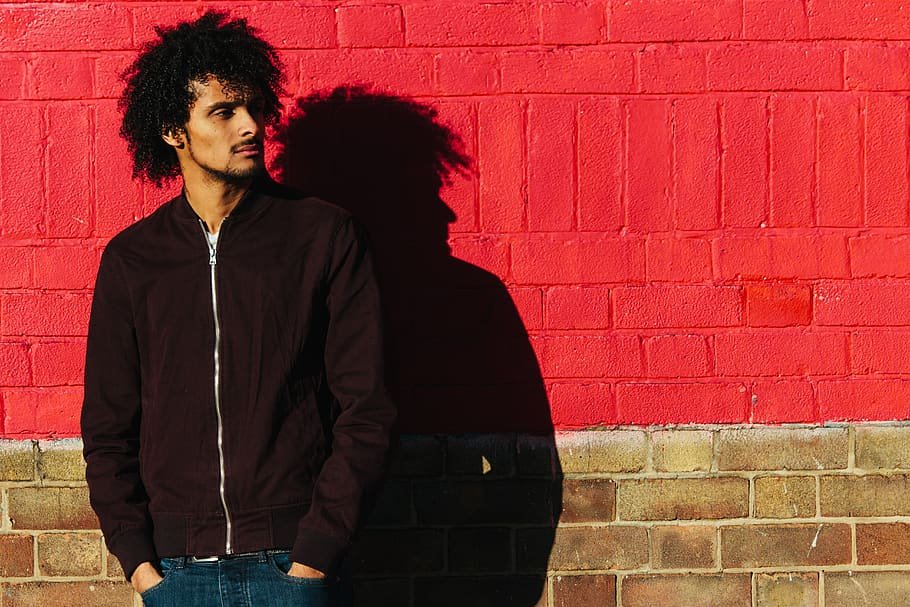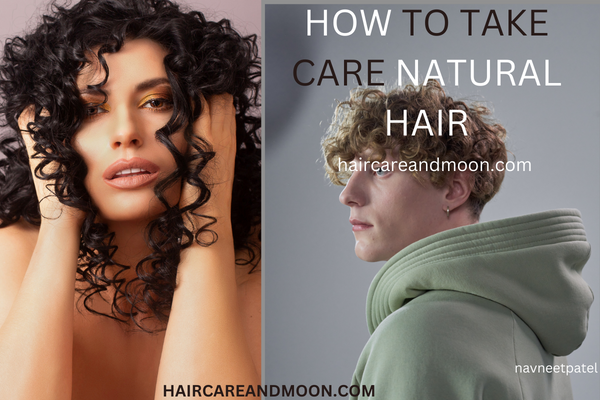
How to take care natural hair
How to take care natural Hair: A Comprehensive Guide
How to take care natural hair can be a challenging but rewarding experience. Whether you’ve recently embraced your natural hair or have been styling your hair for years, it’s essential to have a solid understanding of how to maintain and nourish your hair. In this article, we’ll discuss tips and tricks for natural hair care, from choosing the right products to creating great styles.
Before How to take care natural hair it is important to identify your hair. This can be done by looking at the natural condition of your hair or by using a hair typing system. Understanding your hair type will help you choose the right products and techniques to best care for your hair.


2. Use the Right Products
A very important line of How to care natural hair is to use products that are specifically designed for your hair and are free from harsh chemicals and sulphates. Look for products that contain natural ingredients and moisturizers to help keep your hair healthy and hydrated.
3. Wash Your Hair Properly
Washing your hair is an important part of maintaining its health. Use a gentle, sulfate-free shampoo to clean your hair without stripping it of its natural oils. Follow up with a moisturizing conditioner to help detangle hair and lock in moisture.
4. Deep Conditioning
Deep conditioning is essential for How to take care natural hair, as it helps repair damaged hair and retain moisture. Use a deep conditioner at least once a week to nourish and protect your hair.
5. Style Your Hair
When styling your hair, choose methods that are gentle on your hair and create defined curls or waves. This may include braiding, twisting or using heat-free styling techniques such as the LOC method or Bantu knots.
6. Protect Your Hair at Night
At night, protect your hair by wearing a satin or silk bonnet to keep it from getting tangled and tangled. You can also use a satin or silk pillowcase to keep your hair in place while you sleep.
7. Trim Regularly
Trimming your hair is essential to remove split ends and maintain healthy hair growth. Aim to trim your hair every 6-8 weeks or as needed to prevent damage from progressing.
8. Be Patient and Persistent
How to take care natural hair can take time and practice. Experiment with different products, techniques, and routines to find what works best for your hair. As you continue to nourish and maintain your hair, you will notice improvements in its health and appearance. By following these tips and incorporating them into your hair care routine, you will be on your way to caring for and enjoying your natural hair.
what are some common misconceptions about natural hair care
Some common misconceptions about natural hair care include:
Natural hair does not grow: How to take care natural hair
This myth often stems from seeing shrinkage, but the truth is that natural hair grows. Growth may take longer to become noticeable due to the curl/coil pattern of natural hair
Natural hair does not require trimming:
While natural hair is generally more flexible, it is also not immune to split ends and breakage. Regular trimming is essential to keep hair healthy. Trimming prevents split ends from growing into the hair roots, reduces the risk of breakage and promotes overall hair growth
The most important thing to consider is the type of your curls:
Although understanding your curl pattern can be helpful, it is not the only factor to consider in natural hair care. Other aspects such as porosity, density and elasticity also play an important role in determining the most effective care routine
Long hair equals healthy hair:
Hair length does not necessarily equate to its health. The focus should be on the overall health of the hair, including factors such as moisture, strength and minimal breakage.
Heat Makes Hair Grow Faster Naturally:
These misconceptions can cause confusion and frustration in natural hair care. It is important to have evidence-based information and proper education to make informed decisions about natural hair care.
Heat does not promote hair growth. While heat can temporarily change the appearance of hair, excessive use can cause damage and hinder growth.
Some common myths about natural hair care that can be damaging to hair include: How to take care natural hair
Natural hair does not grow:
This misconception stems from seeing shrinkage, but natural hair does grow. Growth may take longer to become noticeable due to the curl/coil pattern of natural hair
Natural hair is strong:
While natural hair is delicate and prone to damage if not taken care of, some people believe that all types of natural hair are strong. This misconception can lead to lack of proper care and maintenance
More trimming means faster hair growth
The notion that trimming hair makes it grow faster is not supported by scientific evidence. Trimming hair is necessary to keep it healthy and prevent split ends, but it does not directly promote faster growth.
Long hair equals healthy hair:
Hair length does not necessarily equate to its health. The focus should be on the overall health of the hair, including factors such as moisture, strength and minimal breakage.
How to care natural hair naturally at home: How to take care natural hair
How to take care natural hair at home can be a rewarding and eco-friendly experience. Here are some natural hair care tips and treatments that you can easily do at home:
Tips for Maintaining Natural Hair at Home
- Cold Water Rinse: Finish shampooing your hair with a cold water rinse to seal the hair cuticles and promote shine
- Moisture, Moisture, Moisture: Keep your hair well-moisturized to maintain its health and vitality
- Low Manipulation and Protective Styling: Minimize excessive brushing and combing to reduce unnecessary shedding. Protective styles like braids or twists can help retain length and give your hair a break from manipulation
- Avoid Direct Heat Styling: Heat can cause damage to natural hair. Minimize the use of heat styling tools to maintain the health of your hair
- Trim Your Hair Regularly: Trimming helps prevent split ends and breakage, promoting overall hair growth
Natural Hair Treatments You Can Do at Home
- Coconut Oil Mask: Coconut oil is known for its moisturizing properties. Apply warm coconut oil to your hair and scalp, leave it on for about 30 minutes, then rinse thoroughly
- Avocado Hair Masque: Avocado is rich in natural oils and vitamins that can nourish and moisturize your hair. Mash a ripe avocado and apply it to your hair, leaving it on for about 20 minutes before rinsing
- Aloe Vera Scalp Soothe: Aloe vera can help soothe the scalp and promote hair health. Apply aloe vera gel directly to your scalp and leave it on for 15-20 minutes before rinsing
- Egg Protein Treatment: Eggs are rich in protein, which can help strengthen your hair. Beat an egg and apply it to your hair, leave it on for 15-20 minutes, then rinse with cool water
- Yogurt and Honey Conditioning: This combination can act as a natural conditioner for your hair. Mix plain yogurt with honey, apply it to your hair, and leave it on for about 30 minutes before rinsing
By incorporating these tips and treatments into your hair care routine, you can maintain the health and beauty of your natural hair using eco-friendly and natural methods.

How to care natural hair for beginners: How to take care natural hair
If you’re new to How to take care natural hair, it can be overwhelming to know where to start. Here are some tips to help you get started:
- Develop a Simple Hair Care Routine: Start with a simple hair care routine that includes shampooing, conditioning, and moisturizing your hair. Use products that are specifically designed for your hair type and avoid harsh chemicals like sulfates and parabens.
- Moisturize Your Hair Regularly: Natural hair tends to be dry, so it’s important to keep it moisturized. Use a leave-in conditioner or natural oils like coconut oil or shea butter to keep your hair hydrated.
- Avoid Heat Styling: eat styling can damage natural hair, so it’s best to avoid it whenever possible. Instead, opt for heat-free styling techniques like braids, twists, or bantu knots.
- Protect Your Hair at Night: Protect your hair at night by sleeping on a satin or silk pillowcase or wearing a satin or silk bonnet. This will help prevent breakage and keep your hair looking healthy.
- Trim Your Hair Regularly: Trimming your hair regularly helps prevent split ends and breakage, promoting overall hair growth. Aim to trim your hair every 6-8 weeks or as needed.
- Try Natural Hair Treatments: Natural hair treatments like coconut oil masks, avocado hair masques, and egg protein treatments can help nourish and strengthen your hair. These treatments can be done at home using natural ingredients. By following these tips, you can develop a simple and effective natural hair care routine that promotes healthy hair growth and enhances the beauty of your natural hair.
How to keep natural hair soft
To keep natural hair soft, you can try the following methods and treatments: How to take care natural hair
- Use Natural Oils: Consider using natural oils such as coconut oil, olive oil, shea butter, or avocado oil to moisturize and soften your hair. These oils can be applied to the hair and scalp to help lock in moisture and prevent dryness
- Deep Conditioning: Regular deep conditioning treatments can help keep natural hair soft and moisturized. Natural deep conditioners penetrate the hair strands, providing the moisture and nutrients needed to keep the hair healthy and soft
- Pre-Poo Treatment: Before shampooing, consider using a pre-poo treatment with a carrier oil like avocado, jojoba, or sweet almond. This can help protect the hair from the drying effects of shampoo and keep it soft and moisturized
- Regular Trimming: Trimming your hair regularly can help get rid of split ends and brittle ends, which can contribute to dryness. This can help keep your hair soft and healthy
- Seal in Moisture: After applying a water-based moisturizer, consider using a lightweight, natural oil to seal in the moisture. This can help keep your hair moisturized without weighing it down or creating product buildup
- Avoid Over-Styling: Over-styling your hair can lead to dryness and breakage. Minimize the use of heat styling tools and harsh styling products to help keep your hair soft and healthy
How to boost your hair’s shine, strength and growth with rice water
Yes, rice water can help hair in several ways. Rice water is the starchy water left over after rice is cooked or left to soak, and it is rich in vitamins, minerals, and amino acids that can nourish and strengthen hair
Some of the benefits of using rice water on hair include: How to take care natural hair
- Promotes Hair Growth: Rice water can help promote hair growth by strengthening the hair and delivering essential nutrients to the hair follicles
- Improves Hair Elasticity: Rice water can improve hair elasticity, making it stronger and less prone to breakage
- Adds Shine and Strength: Rice water can make hair shinier and stronger, improving its overall appearance and health
- Treats Dandruff: Rice water has anti-inflammatory properties that can help soothe the scalp and treat dandruff
To use rice water on hair, you can rinse your hair with it after shampooing, massage it into your scalp, and leave it on for up to 20 minutes before rinsing with warm water
While there is limited scientific evidence to support the benefits of rice water for hair, many people have reported positive results from using it
Rice water for hair: Benefits and how to use it
To make rice water for hair, you can follow these simple steps: How to take care natural hair
Basic Rice Water Recipe: Use 1/2 cup of uncooked rice. Rinse the rice well to remove any impurities .Put the rinsed rice into a bowl and cover it with 2-3 cups of water. Let the rice soak in the water for 30 minutes or more. After soaking, strain the rice water into a new bowl, jar, or spray bottle
Alternative Soaking Method: Some people prefer to use a 1:2 ratio of rice to water and let it soak for a longer period to extract more nutrients. For example, 1 cup of rice with 2 cups of water for 30 minutes or more
Boiling Method:Another way to make rice water is by boiling the rice. Cover 1/2 cup of rice with double the water typically used for cooking. Cook the rice in boiling water and then strain the rice water into a bowl or container
Fermentation:Some individuals also ferment the rice water to enhance its benefits. To ferment, follow the soaking or boiling method, then leave the rice water at room temperature for 12-24 hours before straining and storing it in the refrigerator
Storage:Store the rice water in a jar or spray bottle. It can be kept in the refrigerator for up to a week
When using rice water on your hair, it’s recommended to apply it as a rinse in your hair care routine. After shampooing, pour the rice water onto your hair, massage it into the hair and scalp, leave it on for up to 20 minutes, and then rinse your hair thoroughly with warm water
It’s important to note that overuse of rice water can lead to protein overload, which may contribute to dryness, frizz, and brittle hair, so it’s advisable to use it no more than two times per week
helpful set of do's and don'ts for taking care of natural hair is essential
Do's: How to take care natural hair
Embrace Your Texture: DO appreciate and celebrate your natural hair texture. Embrace the curls, kinks, and coils that make your hair uniquely yours.
Hydration is Key: DO keep your hair hydrated by regularly moisturizing with leave-in conditioners or natural oils. Well-hydrated hair is happy hair.
Gentle Detangling: DO detangle your hair gently, starting from the tips and working your way up. Use a wide-tooth comb or your fingers to minimize breakage.
Protective Styling: DO consider protective styles like braids or twists to minimize manipulation and promote healthy hair growth.
Use Natural Products: DO opt for natural hair care products free from harsh chemicals. Look for sulfate-free shampoos and silicone-free conditioners to maintain your hair’s natural beauty.
Regular Trims: DO schedule regular trims to get rid of split ends and maintain the shape of your natural hairstyle.
Deep Conditioning: DO indulge in deep conditioning treatments to nourish your hair. This helps maintain elasticity and prevents breakage.
Healthy Lifestyle: DO maintain a healthy lifestyle with a balanced diet, regular exercise, and sufficient sleep. Your hair’s health is often a reflection of your overall well-being.
Don'ts: How to take care natural hair
Avoid Heat Damage: DON’T overuse heat styling tools. Excessive heat can lead to damage and loss of natural curl pattern.
Say No to Tight Styles: DON’T opt for excessively tight hairstyles that can cause tension and lead to breakage. Your hair deserves to be treated gently.
Skip the Daily Wash: DON’T wash your hair daily. Natural hair tends to be drier, and overwashing can strip away essential oils, leading to dryness and frizz.
Chemical Overload: DON’T overload your hair with too many chemical treatments. Give your hair a break and allow it to recover from any previous treatments.
Avoid Cotton Pillowcases: DON’T sleep on cotton pillowcases as they can absorb moisture from your hair. Opt for satin or silk pillowcases to help retain moisture.
Detangling on Dry Hair: DON’T detangle your hair when it’s dry. This can lead to breakage. Always detangle with a conditioner or water to provide slip.
Ignoring Your Scalp: DON’T neglect your scalp. Keep it clean and moisturized to promote healthy hair growth.
Stress Less: DON’T let stress take a toll on your hair. Practice stress-reducing activities to maintain overall health, including the health of your hair.

Here's a set of frequently asked questions with corresponding do's and don'ts: How to take care natural hair
Q: How often should I wash my natural hair?
Do: Wash your natural hair as needed, typically every 1-2 weeks. Adjust based on your hair’s specific needs and lifestyle. Use sulfate-free shampoos to retain natural oils.
Don’t: Avoid overwashing, as it can strip your hair of essential oils, leading to dryness. Also, steer clear of harsh shampoos with sulfates that can be damaging.
Q: Is it necessary to use a conditioner every time I wash my hair?
Do: Absolutely! Use a moisturizing conditioner after each wash to keep your natural hair hydrated and manageable. Leave-in conditioners are also great for added moisture.
Don’t: Don’t skip conditioning. Without proper moisture, natural hair can become brittle and prone to breakage.
Q: Are heat styling tools safe for natural hair?
Do: Use heat styling tools sparingly, and when you do, apply a heat protectant. Opt for lower heat settings to prevent damage. Embrace your natural texture when possible.
Don’t: Avoid excessive heat styling, as it can lead to heat damage and alter your natural curl pattern. Give your hair regular breaks from heat.
Q: How can I protect my natural hair at night?
Do: Wrap your hair in a satin or silk scarf or use a satin pillowcase to prevent friction and retain moisture. Consider protective styles like braids or twists for added care.
Don’t: Avoid sleeping directly on cotton pillowcases, as they can absorb moisture from your hair, leading to dryness and frizz.
Q: Should I trim my natural hair regularly?
Do: Schedule regular trims every 2-3 months to get rid of split ends and maintain the health of your natural hairstyle.
Don’t: Don’t neglect trims. Skipping them can lead to increased breakage and hinder healthy hair growth.
Q: Can I use any hair products on my natural hair?
Do: Use natural and sulfate-free products that cater to your hair’s specific needs. Look for ingredients like shea butter, coconut oil, and aloe vera for added nourishment.
Don’t: Avoid products with harsh chemicals, sulfates, and silicones that can weigh down your hair and cause buildup.
Q: How can I combat frizz in my natural hair?
Do: Apply leave-in conditioners and natural oils to combat frizz. Consider protective styles like twists or braids, and use anti-frizz products sparingly.
Don’t: Don’t skip moisturizing. Dry hair is more prone to frizz, so keeping your hair well-hydrated is key.
Q: Can stress affect my natural hair?
Do: Practice stress-reducing activities, maintain a healthy lifestyle, and prioritize self-care to promote overall well-being, including the health of your hair.
Don’t: Avoid letting stress take a toll on your hair. High-stress levels can contribute to hair loss and other issues.
FAQs: How to take care natural hair
Q: Why is it important to embrace natural hair?
A: Embracing your natural hair is a celebration of your unique beauty. It allows your hair to thrive in its natural state, promoting healthier strands and boosting your confidence.
Q: How often should I wash my natural hair?
A: Wash your natural hair every 1-2 weeks, adjusting based on your lifestyle and hair type. Use sulfate-free shampoos to cleanse without stripping away natural oils.
Q: Can I skip conditioner occasionally?
A: While it’s tempting, don’t skip conditioner! It’s like a hug for your hair, keeping it moisturized, manageable, and ready to conquer the day.
Q: Are heat styling tools a friend or foe for natural hair?
A: Treat them like a cool but distant friend. Use heat protectant, choose lower temperatures, and give your hair breaks. Embrace your natural texture whenever you can!
Q: How do I protect my hair at night?
A: Nighttime is like a spa day for your hair! Wrap it in a satin or silk scarf, or use a pillowcase made of these materials to reduce friction and maintain moisture.
Q: How often should I trim my natural hair?
A: Think of trimming as a regular self-care appointment for your hair. Schedule it every 2-3 months to keep those split ends at bay and maintain a healthy hairstyle.
Q: Can I experiment with different hair products?
A: Absolutely! Experiment with natural and sulfate-free products. Your hair will thank you for the goodness of ingredients like shea butter and coconut oil.
Q: Frizz – friend or foe, and how to deal with it?
A: Frizz can be a quirky friend! Tame it with leave-in conditioners, natural oils, and protective styles. Remember, a little frizz adds character!
Q: Can stress affect my natural hair?
A: Stress is like a party crasher for your hair. Practice stress-relieving activities, maintain a healthy lifestyle, and pamper yourself. Your hair will love the positive vibes.
In conclusion, How to take care natural hair is a celebration of individuality and self-love. Embracing your unique curls, kinks, and coils is not just a beauty statement but a commitment to the health and vitality of your hair. From washing routines to nighttime care, from trimming to product choices, this FAQ guide is your friendly companion on the path to natural hair nirvana.
Remember, your hair is as unique as you are, and the do’s and don’ts are not rigid rules but friendly suggestions to help your hair flourish. With a dash of moisture, a sprinkle of care, and a lot of love, your natural hair can become a testament to your beauty and authenticity.
So, here’s to celebrating the beauty of natural hair, one strand at a time. May your curls be bouncy, your coils be defined, and your confidence radiate as you embrace the journey of taking care of your beautiful, natural hair!



Nice content
Pingback: 12 professional can curly hair become wavy
Pingback: best short curly hairstyles for women in 2024
Pingback: 10 accurate Women’s hair loss Remedies